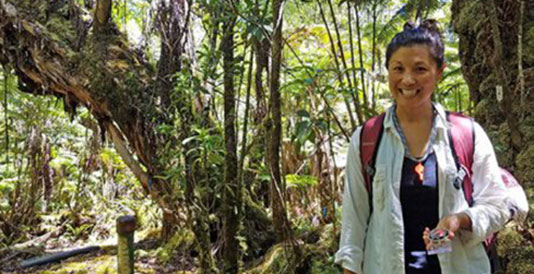 December 7, 2017 (Source: FSU) - Stephanie Pau (FSU) has been awarded a National Geographic grant for her research on tropical forest phenology and climate change by the organization’s Committee for Research and Exploration. Phenology, often referred to as “nature’s calendar,” is the study of periodic plant and animal life cycle events, such as the timing of plant bud bursts or bird migrations, and how these are influenced by seasonal and interannual variations in climate, as well as habitat factors, such as elevation. “Changes in plant phenology have provided some of the best examples of climate change impacts on species and ecosystems,” Pau said. “However, most of this evidence comes from temperate or high-latitude ecosystems. In the tropics, the year-round growing season and the diversity of species exhibiting distinct phenological strategies complicates our understanding of plant phenology.” Pau’s project, “Tropical Forest Phenology in a Changing Climate,” seeks to identify the phenological diversity of plants in two contrasting tropical forest habitats on the island of Hawai‘i, part of a biodiversity hotspot. The proposed research will use monthly field collections of seeds and leaves that fall to the ground, known as litterfall, linked with state-of-the-art satellite observations, which provide repeat wall-to-wall coverage of the Earth’s changing surface.
December 7, 2017 (Source: FSU) - Stephanie Pau (FSU) has been awarded a National Geographic grant for her research on tropical forest phenology and climate change by the organization’s Committee for Research and Exploration. Phenology, often referred to as “nature’s calendar,” is the study of periodic plant and animal life cycle events, such as the timing of plant bud bursts or bird migrations, and how these are influenced by seasonal and interannual variations in climate, as well as habitat factors, such as elevation. “Changes in plant phenology have provided some of the best examples of climate change impacts on species and ecosystems,” Pau said. “However, most of this evidence comes from temperate or high-latitude ecosystems. In the tropics, the year-round growing season and the diversity of species exhibiting distinct phenological strategies complicates our understanding of plant phenology.” Pau’s project, “Tropical Forest Phenology in a Changing Climate,” seeks to identify the phenological diversity of plants in two contrasting tropical forest habitats on the island of Hawai‘i, part of a biodiversity hotspot. The proposed research will use monthly field collections of seeds and leaves that fall to the ground, known as litterfall, linked with state-of-the-art satellite observations, which provide repeat wall-to-wall coverage of the Earth’s changing surface.











